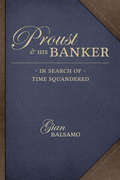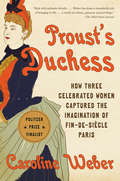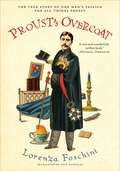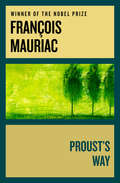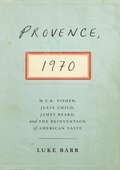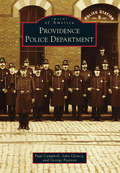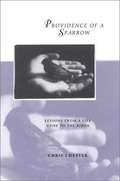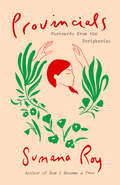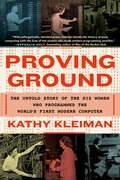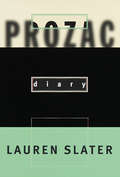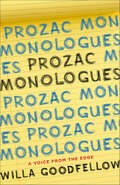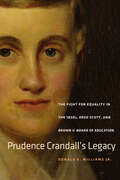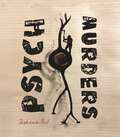- Table View
- List View
Proust & His Banker: In Search of Time Squandered
by Gian BalsamoThis study explores the surprising relationship between Proust’s creative genius, his financial extravagance, and the steady hand that kept him afloat.What Marcel Proust wanted from life most of all was unconditional requited love, and the way he went after it—smothering the objects of his affection with gifts—cost him a fortune. To pay for such extravagance, he engaged in daring speculations on the stock exchange. The task of his cousin and financial adviser, Lionel Hauser, was to make sure these speculations would not go sour. In Proust and His Banker, Gian Balsamo examines this vital, complex relationship and reveals that the author’s liberal squandering of money provided the grist for many of the fictional characters and dramatic events he wrote about.Focusing on hundreds of letters between Proust and Hauser among other archival and primary sources, Balsamo provides a fascinating window into the writer’s creative process, his financial activities, and the surprising relationship between the two. Successes and failures alike provided material for Proust’s fiction, whether from the purchase of an airplane for the object of his affections or the investigation of a deceased love’s intimate background. Over the course of their fifteen-year collaboration, the banker saw Proust squander three-fifths of his wealth. To Hauser the writer was a virtuoso in resource mismanagement. Nonetheless, Balsamo shows, we owe it to the altruism of this generous relative, who never thought twice about sacrificing his own time and resources to Proust, that In Search of Lost Time was ever completed.
Proust Was a Neuroscientist
by Jonah LehrerThe New York Times–bestselling author provides an &“entertaining&” look at how artists enlighten us about the workings of the brain (New York magazine). In this book, the author of How We Decide and Imagine: How Creativity Works &“writes skillfully and coherently about both art and science&”—and about the connections between the two (Entertainment Weekly). In this technology-driven age, it&’s tempting to believe that science can solve every mystery. After all, it&’s cured countless diseases and sent humans into space. But as Jonah Lehrer explains, science is not the only path to knowledge. In fact, when it comes to understanding the brain, art got there first. Taking a group of artists—a painter, a poet, a chef, a composer, and a handful of novelists—Lehrer shows how each one discovered an essential truth about the mind that science is only now rediscovering. We learn, for example, how Proust first revealed the fallibility of memory; how George Eliot discovered the brain&’s malleability; how the French chef Escoffier discovered umami (the fifth taste); how Cézanne worked out the subtleties of vision; and how Gertrude Stein exposed the deep structure of language—a full half-century before the work of Noam Chomsky and other linguists. More broadly, Lehrer shows that there&’s a cost to reducing everything to atoms and acronyms and genes. Measurement is not the same as understanding, and art knows this better than science does. An ingenious blend of biography, criticism, and first-rate science writing, Proust Was a Neuroscientist urges science and art to listen more closely to each other, for willing minds can combine the best of both to brilliant effect. &“His book marks the arrival of an important new thinker . . . Wise and fresh.&” —Los Angeles Times
Proust's Duchess: How Three Celebrated Women Captured the Imagination of Fin-de-Siecle Paris
by Caroline WeberFrom the author of the acclaimed Queen of Fashion--a brilliant look at the glittering world of turn-of-the-century Paris through the first in-depth study of the three women Proust used to create his supreme fictional character, the Duchesse de Guermantes.Geneviève Halévy Bizet Straus; Laure de Sade, Comtesse de Adhéaume de Chevigné; and Élisabeth de Riquet de Caraman-Chimay, the Comtesse Greffulhe--these were the three superstars of fin-de-siècle Parisian high society who, as Caroline Weber says, "transformed themselves, and were transformed by those around them, into living legends: paragons of elegance, nobility, and style." All well but unhappily married, these women sought freedom and fulfillment by reinventing themselves, between the 1870s and 1890s, as icons. At their fabled salons, they inspired the creativity of several generations of writers, visual artists, composers, designers, and journalists. Against a rich historical backdrop, Weber takes the reader into these women's daily lives of masked balls, hunts, dinners, court visits, nights at the opera or theater. But we see as well the loneliness, rigid social rules, and loveless, arranged marriages that constricted these women's lives. Proust, as a twenty-year-old law student in 1892, would worship them from afar, and later meet them and create his celebrated composite character for The Remembrance of Things Past.
Proust's Overcoat: The True Story of One Man's Passion for All Things Proust
by Lorenza Foschini“A rare and wonderfully written book of literary detection that is heartbreaking as well as thrilling.”—Michael Ondaatje, author of The English PatientIn the tradition of Simon Winchester’s The Professor and the Madman comes Proust’s Overcoat by Lorenza Foschini—the charming, endlessly intriguing story of a collector’s obsessive search for the personal effects of legendary author Marcel Proust. This fascinating true story introduces readers to a truly delightful character—Jacques Guérin, owner of a perfume company in France—and enthralls them with his relentless lifelong pursuit of all things Proustian, even the author’s most mundane possessions.
Proust's Way
by François MauriacThe thinking and suffering of the author of Remembrance of Things Past are intimately exposed in these letters to Mauriac.
Provence, 1970
by Luke BarrProvence, 1970 is about a singular historic moment. In the winter of that year, more or less coincidentally, the iconic culinary figures James Beard, M.F.K. Fisher, Julia Child, Richard Olney, Simone Beck, and Judith Jones found themselves together in the South of France. They cooked and ate, talked and argued, about the future of food in America, the meaning of taste, and the limits of snobbery. Without quite realizing it, they were shaping today's tastes and culture, the way we eat now. The conversations among this group were chronicled by M.F.K. Fisher in journals and letters--some of which were later discovered by Luke Barr, her great-nephew. In Provence, 1970, he captures this seminal season, set against a stunning backdrop in cinematic scope--complete with gossip, drama, and contemporary relevance.
Providence Police Department (Images of America)
by George Pearson Paul Campbell John GlancyThe Providence Police Department has served New England's second-largest city from its beginnings in 1651 with the appointment of a town sergeant to today's force of nearly 500 men and women. Officially established in 1864, policing in Providence has changed considerably from the days of night watchmen armed with handheld rattle alarms and nightsticks. Whether quelling the violent street riots of 1914, enforcing Prohibition, or fighting the New England mob, the PPD has evolved to meet the complex challenges posed by the city. It also boasts a history of leadership among the nation's law enforcement agencies, being among the first to incorporate women into the department's ranks, create innovative campaigns to reduce traffic fatalities, and pioneer the use of trained canines to aid in police work. Today, cutting-edge telecommunications and forensic analysis in crime fighting continue to protect the city of nearly 178,000.
Providence and the Invention of American History
by Sarah KoenigHow providential history—the conviction that God is an active agent in human history—has shaped the American historical imagination In 1847, Protestant missionary Marcus Whitman was killed after a disastrous eleven-year effort to evangelize the indigenous peoples of the Pacific Northwest. By 1897, Whitman was a national hero, celebrated in textbooks, monuments, and historical scholarship as the &“Savior of Oregon.&” But his fame was based on a tall tale—one that was about to be exposed. Sarah Koenig traces the rise and fall of Protestant missionary Marcus Whitman&’s legend, revealing two patterns in the development of American history. On the one hand is providential history, marked by the conviction that God is an active agent in human history and that historical work can reveal patterns of divine will. On the other hand is objective history, which arose from the efforts of Catholics and other racial and religious outsiders to resist providentialists&’ pejorative descriptions of non‑Protestants and nonwhites. Koenig examines how these competing visions continue to shape understandings of the American past and the nature of historical truth.
Providence of a Sparrow: Lessons from a Life Gone to the Birds
by Chris ChesterHouse sparrow "B" fell twenty-five feet from his nest into the life of Chris Chester. The encounter was providential for both of them. B and Chester spent hours together playing games like bottle-cap fetch or hide-and-seek. They learned "words" in each other's vocabularies. B developed a fetish for nostrils and a dislike of the color yellow. He grew anxious if Chester came home late from work. At bedtime he would rub his sleepy eyes on Chester's thumb and settle to sleep in his palm. Chester ended up turning part of his house into an aviary and adjusting his social life to meet B's demands. This was a small price to pay, though, for the trust and comfort of a twenty-five-gram friend who brought joy and wonder back into his life.
Providence: The Story of a Fifty-Year Vision Quest
by Daniel QuinnProvidence is Quinn's fascinating memoir of his life-long spiritual voyage. His journey takes him from a childhood dream in Omaha setting him on a search for fulfillment, to his time as a postulant in the Trappist order under the guidance of eminent theologian Thomas Merton. Later, his quest took him through the deep self-discovery of psychoanalysis, through a failed marriage during the turbulent and exciting 60s, to finding fulfillment with his wife Rennie and a career as a writer. In Providence Quinn also details his rejection of organized religion and his personal rediscovery of what he says is humankind's first and only universal religion, the theology that forms the basis for Ishmael.Providence is an insightful book that address issues of education, psychology, religion, science, marriage, and self-understanding, and will give insight to anyone who has ever struggled to forge and enact a personal spirituality.From the Trade Paperback edition.
Provincials: Postcards from the Peripheries
by Sumana RoyAn enchanting and joyous exploration of life and creativity at the geographical edges of the modern world Who is a provincial? In this subversive book, Sumana Roy assembles a striking cast of writers, artists, filmmakers, cricketers, tourist guides, English teachers, lovers and letter writers, private tutors and secret-keepers whose lives and work provide varied answers to that question. Combining memoir with the literary, sensory, and emotional history of an ignored people, she challenges the metropolitan&’s dominance to reclaim the joyous dignity of provincial life, its tics and taunts, enthusiasms and tragicomedies. In a wide-ranging series of &“postcards&” from the peripheries of India, Europe, America, and the Middle East, Roy brings us deep into the imaginative world of those who have carried their provinciality like a birthmark. Ranging from Rabindranath Tagore to William Shakespeare, John Clare to the Bhakti poets, T. S. Eliot to J. M. Coetzee, V. S. Naipaul to the Brontës, and Kishore Kumar to Annie Ernaux, she celebrates the provincials&’ humor and hilarity, playfulness and irony, belatedness and instinct for carefree accidents and freedom. Her unprecedented account of provincial life offers an alternative portrait of our modern world.
Proving Ground: The Untold Story of the Six Women Who Programmed the World’s First Modern Computer
by Kathy KleimanDiscover a fascinating look into the lives of six historic trailblazers in this World War II-era story of the American women who programmed the world's first modern computer. After the end of World War II, the race for technological supremacy sped on. Top-secret research into ballistics and computing, begun during the war to aid those on the front lines, continued across the United States as engineers and programmers rushed to complete their confidential assignments. Among them were six pioneering women, tasked with figuring out how to program the world's first general-purpose, programmable, all-electronic computer—better known as the ENIAC—even though there were no instruction codes or programming languages in existence. While most students of computer history are aware of this innovative machine, the great contributions of the women who programmed it were never told—until now. Over the course of a decade, Kathy Kleiman met with four of the original six ENIAC Programmers and recorded extensive interviews with the women about their work. Proving Ground restores these women to their rightful place as technological revolutionaries. As the tech world continues to struggle with gender imbalance and its far-reaching consequences, the story of the ENIAC Programmers' groundbreaking work is more urgently necessary than ever before, and Proving Ground is the celebration they deserve.
Prozac Diary
by Lauren SlaterThe author of the acclaimed Welcome to My Country describes in this provocative and funny memoir the ups and downs of living on Prozac for ten years, and the strange adjustments she had to make to living "normal life." Today millions of people take Prozac, but Lauren Slater was one of the first. In this rich and beautifully written memoir, she describes what it's like to spend most of your life feeling crazy--and then to wake up one day and find yourself in the strange state of feeling well. And then to face the challenge of creating a whole new life. Once inhibited, Slater becomes spontaneous. Once terrified of maintaining a job, she accepts a teaching position and ultimately earns several degrees in psychology. Once lonely, she finds love with a man who adores her. Slater is wonderfully thoughtful and articulate about all of these changes, and also about the downside of taking Prozac: such matters as dependency, sexual dysfunction, and Prozac "poop-out." "The beauty of Lauren Slater's prose is shocking," said Newsday about Welcome to My Country, and Slater's remarkable gifts as a writer are present here in sentences that are like elegant darts, hitting at the center of the deepest human feelings. Prozac Diary is a wonderfully written report from inside a decade on Prozac, and an original writer's acute observations on the challenges of living modern life.
Prozac Monologues: A Voice from the Edge
by Willa GoodfellowShe was going to stab her doctor, but she wrote a book instead.Years later, Willa Goodfellow revisits her account of the antidepressant-induced hypomania that hijacked her Costa Rican vacation and tells the rest of the story: her missed diagnosis of Bipolar 2, how she’d been given the wrong medications, and finally, her process of recovery.Prozac Monologues is a book within a book—part memoir of misdiagnosis and part self-help guide about life on the bipolar spectrum. Through edgy and comedic essays, Goodfellow offers information about a mood disorder frequently mistaken for major depression as well as resources for recovery and further study. Plus, Costa Rica. · If your depression keeps coming back . . . · If your antidepressant side effects are dreadful . . . · If you are curious about the bipolar spectrum . . . · If you want ideas for recovery from mental illness . . . · If you care for somebody who might have more than depression . . . . . . This book is for you.
Prozac Nation: Young and Depressed in America
by Elizabeth WurtzelIn Prozac Nation, Wurtzel describes her harrowing battle with clinical depression before she was finally treated with Prozac. In a society plagued by divorce, economic instability, and AIDS, Wurtzel depicts the growing number of depressed and overmedicated people in America.
Prude: Lessons I Learned When My Fiancé Filmed Porn
by Emily SouthwoodIn a culture obsessed with sex, the era of Dad's Playboy is long gone. Today, endless free porn is a click away and full-frontal photos appear on sites as accessible as Twitter, yet many couples struggle with the underlying issues of pornography.Emily Southwood considered herself to be sexually liberal-until her fiancé landed a job filming porn for a network reality TV show and her whole world changed overnight. Once confident in her relationship, she suddenly felt jealous, insecure, and obsessively comparative to the porn stars her fiancé was around everyday. She was forced to confront feelings she didn't even know she had: about the treatment of women in the porn industry, the hush-hush attitude toward women watching pornography, and the unrealistic expectations about sex that are often propagated by porn.Prude is a humorous memoir that explores why there is so little communication about porn in relationships. Southwood tells the story of her transformation from feeling sexually liberal-minded to realizing she had issues with porn and the industry her fiancé was a part of. She reveals her bizarre journey to conquer her discomfort around porn-and how she ends up finding herself (and ultimately fixing her relationship for good) along the way.
Prudence Crandall's Legacy: The Fight for Equality in the 1830s, Dred Scott, and Brown v. Board of Education (The Driftless Connecticut Series)
by Donald E. WilliamsThe &“compelling and lively&” story of a pioneering abolitionist schoolteacher and her far-reaching influence on civil rights and American law (Richard S. Newman, author of Freedom&’s Prophet). When Prudence Crandall, a Canterbury, Connecticut schoolteacher, accepted a black woman as a student, she unleashed a storm of controversy that catapulted her to national notoriety, and drew the attention of the most significant pro- and anti-slavery activists of the early nineteenth century. The Connecticut state legislature passed its infamous Black Law in an attempt to close down her school. Crandall was arrested and jailed—but her legal legacy had a lasting impact. Crandall v. State was the first full-throated civil rights case in U.S. history. The arguments by attorneys in Crandall played a role in two of the most fateful Supreme Court decisions, Dred Scott v. Sandford, and the landmark case of Brown v. Board of Education. In this book, author and lawyer Donald E. Williams Jr. marshals a wealth of detail concerning the life and work of Prudence Crandall, her unique role in the fight for civil rights, and her influence on legal arguments for equality in America that, in the words of Brown v. Board attorney Jack Greenberg, &“serves to remind us once more about how close in time America is to the darkest days of our history.&” &“The book offers substantive and well-rounded portraits of abolitionists, colonizationists, and opponents of black equality―portraits that really dig beneath the surface to explain the individuals&’ motivations, weaknesses, politics, and life paths.&” ―The New England Quarterly &“Taking readers from Connecticut schoolrooms to the highest court in the land, [Williams] gives us heroes and villains, triumph and tragedy, equity and injustice on the rough road to full freedom.&” —Richard S. Newman, author of Freedom&’s Prophet
Psych Murders (Made in Michigan Writers Series)
by Stephanie HeitStephanie Heit’s hybrid memoir poem blasts the page electric and documents her experience of shock treatment. Using a powerful mélange of experimental forms, she traces her queer mad bodymind through breathlessness, damage, refusal, and memory loss as it shifts in and out of locked psychiatric wards and extreme bipolar states. Heit survives to give readers access to this somatic, visceral rendering of a bipolar life complete with sardonic humor, while showing us the dire need for new paradigms of mental health care outside closets, attics, prisons, and wards. Psych Murders adds a vital layer of lived experience of electroshocks and suicidal ideation to the growing body of literature of madness and mental health difference.
Psychedelic Bubble Gum: Boyce & Hart, The Monkees, and Turning Mayhem into Miracles
by Bobby Hart Micky Dolenz Glenn BallantyneFrom the man who wrote the music that outsold the Beatles and the Rolling Stones in 1967-1968, . Immerse yourself in Grammy, Golden Globe, and Academy Award nominated songwriter Bobby Hart's world as he shares an exclusive glimpse into his life. Psychedelic Bubble Gum is the story behind his success, the rise of Boyce and Hart as musical goliaths, and their role in launching the Monkees to stardom. With unbending sincerity, Hart details a life of extravagance, betrayal, loss, disillusionment, and an unstoppable personal struggle to find balance, peace, and love. Psychedelic Bubble Gum is a rollercoaster ride through the 1960s and 70s America's whirlwind era of free speech, mysticism, and psychedelic pop culture packed with intimate behind-the-scenes encounters with pop star royalty. Psychedelic Bubble Gum is tempered by humor, honesty, and a singular understanding of the industry.
Psychedelic Refugee: The League for Spiritual Discovery, the 1960s Cultural Revolution, and 23 Years on the Run
by Rosemary Woodruff LearyA memoir by one of the original female psychedelic pioneers of the 1960s • Shares Rosemary&’s early experimentation with psychedelics in the 1950s, her development through the psychedelic revolution of the 1960s, and her involvement, at first exciting but then heartbreaking, with Dr. Timothy Leary • Describes her LSD trips with Leary, their time at the famous Millbrook estate, their experiences as fugitives abroad, including their captivity by the Black Panthers in Algeria, and Rosemary&’s years on the run after she and Timothy separated One of the original female psychedelic pioneers, Rosemary Woodruff Leary (1935-2002) began her psychedelic journey long before her relationship with Dr. Timothy Leary. In the 1950s, she moved to New York City where she became part of the city&’s most advanced music, art, and literary circles and expanded her consciousness with psilocybin mushrooms and peyote. In 1964 she met two former Harvard professors who were experimenting with LSD, Timothy Leary and Ralph Metzner, who invited her to join them at the Millbrook estate in upstate New York. Once at Millbrook, Rosemary went on to become the wife--and accomplice--of the man Richard Nixon called &“the most dangerous man in America.&” In this intimate memoir, Rosemary describes her LSD experiences and insights, her decades as a fugitive hiding both abroad and underground in America, and her encounters with many leaders of the cultural and psychedelic milieu of the 1960s. Compiled from Rosemary&’s own letters and autobiographical writings archived among her papers at the New York Public Library, the memoir details Rosemary&’s imprisonment for contempt of court, the Millbrook raid by G. Gordon Liddy, the tours with Timothy before his own arrest and imprisonment, and their time in exile following his sensational escape from a California prison. She describes their surreal and frightening captivity by the Black Panther Party in Algeria and their experiences as fugitives in Switzerland. She recounts her adventures and fears as a fugitive on five continents after her separation from Timothy in 1971. While most accounts of the psychedelic revolution of the 1960s have been told by men, with this memoir we can now experience these events from the perspective of a woman who was at the center of the seismic cultural changes of that time.
Psychic Junkie: A Memoir
by Sarah LassezThe future lies ahead. BUT YOU CAN PAY FOR A PREVIEW. When her promised stardom fails to materialize, struggling actress Sarah Lassez finds solace in psychics who predict the coming of the man of her dreams. She's sure she's found him in Wilhelm, a suave hotel sous-chef from Germany. But mayhem ensues when she takes the words of the psychics over the words of her actual boyfriend and is convinced he's about to propose -- when in reality he's planning to leave the country . . . without her. Sarah's world dissolves into a haze of credit card debt, loneliness, and a raging addiction to psychics that threatens to destroy her finances, her relationships, and her sanity. She knows she needs help. But getting it will mean confronting the fact that life is not to be controlled or predicted, and though dealing with reality isn't always easy, at least it doesn't cost $4.99 a minute. Psychic Junkie is a true story of life and love in Los Angeles, narrated by an endearing protagonist whose search for answers will resonate with everyone who has ever tried to make sense of career, relationships, and adulthood.
Psychic: My Life in Two Worlds
by Sylvia BrownePSYCHIC is the intimate, first-person, unapologetic, no-holds-barred story behind the story that Sylvia, at the age of 72, is finally ready to tell. In PSYCHIC, Sylvia will reveal the little known truths behind her three failed marriages, including the physical abuse, bankruptcy and legal troubles. While the press had a field day writing about it at the time, Sylvia remained quiet...until now. Sylvia will discuss her painful transitions and the financial and emotional damage inflicted by her husbands. And as an almost parenthetical lesson for all of us in forgiveness and compassion, she'll describe the experience of moving husband Dal Brown back into her house to take care of him when she learned that he was alone and in failing health. Then there are Sylvia's own physical challenges, from a series of painful hip surgeries to her relatively recent discovery that she'd suddenly gone blind in one eye, so that, at the age of 72, when she'd concluded that a limping, one-eyed woman was done when it came to romance, no one was more shocked than she when the real Mr. Right finally, impossibly showed up.
Psychic: My Life in Two Worlds
by Sylvia Browne“I have known Sylvia for twenty years, and I have the greatest respect for her. People seek her out for her much celebrated intuitive skills, however, I have sought her out for her friendship and kindness. I applaud her for the peace and solace that she has brought to so many.” — Montel Williams “An amazing woman, an amazing life, and a book I couldn’t put down. Sylvia is a true inspiration.” — Jeanne Cooper, star of The Young and the RestlessReaching deep beneath the surface of her life—then and now—renowned psychic and #1 New York Times bestselling author Sylvia Browne (The Other Side and Back) candidly discusses details of her professional and personal experiences that she’s never publically revealed before.
Psycho: The Autobiography
by Stuart PearceIn an era of superstar prima donnas, Stuart Pearce's total commitment on the pitch earned him the affection of football fans everywhere, who nicknamed him Psycho. He will forever be remembered for two penalties - one missed and scored - for England, but there is so much more to him than that. This book reveals the fascinating story of one of football's greatest personalities. PSYCHO is as honest and straightforward as the man himself.
Psycho: The Autobiography
by Stuart PearceIn an era of superstar prima donnas, Stuart Pearce's total commitment on the pitch earned him the affection of football fans everywhere, who nicknamed him Psycho. He will forever be remembered for two penalties - one missed and scored - for England, but there is so much more to him than that. This book reveals the fascinating story of one of football's greatest personalities. PSYCHO is as honest and straightforward as the man himself.
